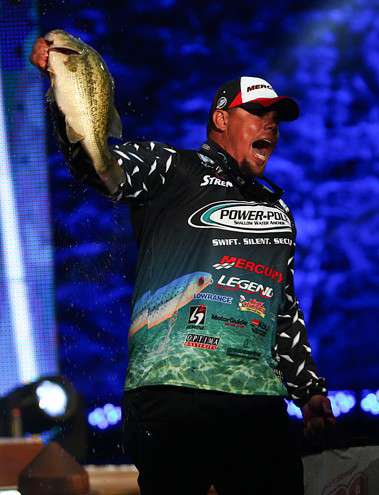
TULSA, Okla. — Gene Gilliland views Grand Lake from an uncommon perspective. Not only has he studied the lake as a fisheries biologist for 30 years, Gilliland continues to be a frequent bass tournament participant, as he has since his junior high school days.
So what does he think it will take to win the three-day 2013 Bassmaster Classic that begins here Friday?
"In an average tournament, it takes 20 pounds to win on Grand Lake," said Gilliland, referencing a five-bass daily limit for one- or multi-day events. "I don't expect it to be any different this week.
"This is a very productive fishery. There aren't a lot of seven-, eight- and nine-pounders, but four- and five-pound bass are relatively common."
In these brutally-cold, late-February conditions, 20 pounds a day sounds like a stretch of the imagination, even with Gilliland's unique perspective.
"I'm not saying it's probable, but it's definitely within the realm of possibility," he said.
If you think this sounds more like the thoughts of an air-headed scientist, rather than the reality of a 2013 Bassmaster Classic participant, you should reconsider. Gilliland's prediction varies little from what the Classic competitors expect, despite their frigid practice time on Grand Lake this week.
"To win, it will take 18 or 19 pounds a day," said Mike Iaconelli. "I think you might still be in the hunt going into the last day with an average of 17-plus the first two days.
"But you're going to have to be within four or five pounds going into the last day to have a legitimate shot."
Iaconelli's projection is common among the 53 competitors.
"Going on what I hear from the other anglers, it will take 18 or 19 pounds a day," said Bobby Lane. "That puts us at 54 to 57 pounds (for three days).
"I think (Friday) we might see a few stringers bigger than that. I know there are a lot of fish in this lake. If I really had to go out on a limb, I like 18 pounds a day, plus a little bit."
There may be a bigger element of the unknown going into this Classic than any of the 42 that preceded it. The cold weather is part of that. It will break the spirit of more than a few over the next three days. The February dates – with or without cold weather – are another element of the unforeseeable.
Jason Christie, 39, is a Classic rookie, but an accomplished pro angler. He lives an hour's drive from Grand Lake and estimates he has fished 50 tournaments here over the past 15 years. Christie has more experience on Grand Lake than anyone else in this field.
"But I can count on one hand the total number of days I've fished here in February," Christie said. "Tournaments never started until March, so I never showed up until the first week in March.
"There's a big difference in the last week of February and the first couple of weeks in March."
Gene Gilliland's official title is now assistant chief of fisheries for the Oklahoma Department of Wildlife Conservation. The ODWC started a "lake record program" for the state's primary water bodies "four or five years ago." For Grand Lake, the largemouth bass leader is a 10.9-pounder caught March 15, 2012. It's recent evidence that a few lunkers live here.
Gilliland went to work for ODWC after college.
"It's the only job I've ever had," said the now 56-year-old fisheries biologist.
And Gilliland has witnessed some ups and downs in Grand Lake's fishing history over his three decades on the job.
On a scale of 1 to 10, how would he rate the current state of this bass fishery?
"It's probably eight or nine," Gilliland said. "It's way up there."
Even with all the unknowns, Grand Lake's potential to produce some fireworks should make for an exciting Bassmaster Classic.
"I still think some of these guys will figure it out," Gilliland said. "I don't know why we won't have a 60-pound winning total on Sunday."
